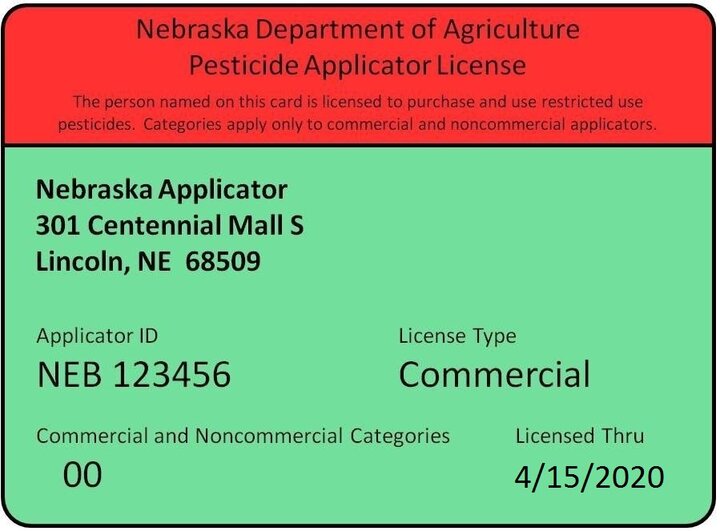Multiple opportunities are available for 2020 commercial/noncommercial pesticide training for applicators to become certified or recertified to use certain pesticides in Nebraska.

The federally required safety training is for restricted use pesticides (RUPs) and in some instances, general use pesticides (GUPs). Separate training sessions are required prior to using paraquat and RUP dicamba.
Commercial applicators are those using RUPs and those using GUPs when making applications in lawn care or structural settings for hire or compensation. Noncommercial applicators are those applying these same pesticides to sites owned by their employer, or for a governmental agency or political subdivision of the state.
In Nebraska, pesticide safety and RUP dicamba training are offered through Nebraska Extension’s Pesticide Safety Education Program (PSEP). The Nebraska Department of Agriculture (NDA) issues 3-year licenses for applicators who pass their certification and pay the fee.
This year there is a new opportunity for potential commercial/noncommercial applicators to receive their initial (first-time) certification.
Initial Certification: New Flipbooks Coming Soon
Initial certification requires studying training materials and passing a General Standards exam, in addition to passing one or more specific applicator category exams.
Initial commercial/noncommercial training materials for 2020 include new PSEP online FlipBooks, coming soon. FlipBooks will combine video with text, eliminating the need to attend on-site training. PSEP’s 19 FlipBooks have searchable text, and text that can be translated into various languages. FlipBooks also offer cost-savings compared to the traditional combination of print manuals and on-site training sessions. FlipBook costs range from $40 to $60; the savings comes in not having to pay $80 for on-site training and travel. FlipBooks will be available for purchase at https://pested.unl.edu. (See more on FlipBooks.)
After studying with FlipBooks, see testing information at https://pested.unl.edu.
Initial Certification: On-Site Training
Initial applicators may still purchase print manuals and attend an on-site training session. Exams are administered at the end of each training session.
For on-site training, advance registration and purchase of the General Standards and category print manual are required. Registration is $80, regardless of the number of applicator categories obtained; PSEP however, recommends no more than two categories in addition to the required General Standards. Print manual costs are an additional $10 to $30, must be purchased at least 10 days in advance of training, and must be taken to the training site.
NDA testing is offered at initial on-site training locations; in addition, computer-based testing for several categories is available at various testing centers.
Each on-site training offers some of the 19 categories; check the schedule booklet to see which are offered at which sites. Once certification is attained in the commercial classification, NDA issues a license for an additional $90 fee. There is no charge for a noncommercial license.
Initial Commercial/Noncommercial On-Site Training Schedule
On-site initial training is offered at the following locations and dates. Available categories vary at each location; check the pesticide applicator education schedule booklet for details. Preregistration, including the $80 fee, is required. Start time is 8:30 a.m.
- Beatrice: Gage County Extension Office, Fairgrounds, 1115 W. Scott, March 17
- Columbus: Platte County Courthouse, 2610 14th St., Feb. 25
- Grand Island: College Park, Hall County Extension Office, 3180 W. Highway 34, Feb. 4 and 25
- Lincoln: Lancaster County Extension Office, 444 Cherrycreek Road, Feb. 4 and 27; March 17; April 9
- Norfolk: Madison County Extension Office, 1305 S. 13th St., Feb. 4 and 25, March 17
- North Platte: Nebraska West Central Research and Extension Center, 402 W. State Farm Road, Feb. 11 and 27, March 17, April 9
- Omaha: Douglas/Sarpy County Extension Office, 8015 W. Center Road, Feb. 11, April 9 and 16
- O’Neill: Holt County Annex, 128 N. Sixth St., Suite 100, April 16
- Scottsbluff: Nebraska Panhandle Research and Extension Center, 4502 Ave. I, Feb. 11, 25 and 27; April 9
Recertification: Commercial/Noncommercial Applicators
Commercial/noncommercial applicators whose licenses expire in April 2020 may recertify at a Crop Production Clinic (CPC) in January, or at on-site Extension video training February-March. Applicators should receive in the mail a PSEP schedule booklet showing certification information and dates. The booklet also is available online, at local Extension offices, or by phoning PSEP at 800-627-7216 or 402-472-1632.
In 2020 approximately 3,500 commercial/noncommercial applicators need to be recertified. They include fumigators, ornamental and turf applicators, exterminators, and others. For individual applicator license status, see http://kellysolutions.com/NE/Applicators/index.htm or call NDA at 402-471-2351. Applicators whose licenses have expired must retest.
In addition to recertification at Extension sites in February and March, options include several annual conferences and trade association meetings as follows.
Recertification Commercial/Noncommercial On-Site Training Schedule
Available categories vary at each location; check the pesticide applicator education schedule booklet for details. Preregistration of $80 is required, https://pested.unl.edu/certification-and-training#commercial. Start time is 8:30 a.m.
- Beatrice: Gage County Extension Office, Fairgrounds, 1115 W. Scott, Feb. 18, March 10 and 19
- Columbus: Platte County Courthouse, 2610 14th St., Feb 20, March 19
- Grand Island: College Park, Hall County Extension Office, 3180 W. Hwy. 34, Feb. 6 and 18
- Holdrege: Phelps County Fairgrounds, Ag Center, 1308 2nd St., Feb. 12, March 10
- Lincoln: Lancaster County Extension Office, 444 Cherrycreek Rd., Feb. 6 and 20, March 26
- Norfolk: Madison County Extension Office, 1305 S. 13th St., Feb. 12, 13 and 18; March 10
- North Platte: Nebraska West Central Research and Extension Center, 402 W. State Farm Rd., Feb. 13 and 18, March 19
- O'Neill: Holt County Annex, 128 N. Sixth St., Suite 100, Feb. 13, March 19
- Omaha: Douglas/Sarpy County Extension Office, 8015 W. Center Rd., Feb. 13, March 19 and 26
- Scottsbluff: UNL Panhandle Research and Extension Center, 4502 Ave. I, Feb. 6 and 20, March 24
Recertification: Additional Commercial/Noncommercial Options
Nebraska Extension Crop Production Clinics are a great option to recertify in the Agricultural Plant (01) category and Demo/Research (D/R) subcategory. Preregistration of $80 is required at https://agronomy.unl.edu/cpc to attend one of the following:
- Jan. 7 – Gering, Gering Civic Center, 1050 M St.
- Jan. 8 – North Platte, Sandhills Convention Center 2102 S. Jeffers St.
- Jan. 10 – Beatrice, Southeast Community College, Truman Center
- Jan. 13 – Norfolk, Lifelong Learning Center, 601 E. Benjamin Ave.
- Jan. 14 – York, Holthus Convention Center, 3130 Holen Ave.
- Jan. 15 – Mead, Eastern Nebraska Research and Extension Center, 1071 County Rd. G
Nebraska Crop Management Conference Jan. 22-23 (note new date from previous announcements) in Kearney, Younes Conference Center, 416 Talmadge Rd. Preregistration required at https://agronomy.unl.edu/NCMC. Cost is $80 for a single day or $150 for both days. Recertification is available either day.
Nebraska Turfgrass Conference Jan. 7-9 in LaVista, LaVista Conference Center, 12540 Westport Parkway. Recertification in Ornamental and Turf Pest Control (04). Preregister at https://nebraskaturfgrass.com or call the Nebraska Turfgrass Association at 402-207-0911.
Nebraska Aviation Trades Association Convention Feb. 25-26 at the Younes Conference Center, 416 W Talmadge Rd., Kearney. Recertification in Ag Plant (01) and Aerial Pest Control (12). For more information, contact tayor@youraam.com or the Nebraska Aviation Trades Association, 531-289-8323.
Training Required for RUP Dicamba, Paraquat
Annual RUP Dicamba Training
Extension training also will be held for the growing number of RUP dicamba products. It is a federal requirement to complete state-approved dicamba training each year prior to using any of these products due to the potential for drift and damage to non-target crops. See https://pested.unl.edu/certification-and-training#dicamba for PSEP training information beginning Jan. 2. This training is free.
Paraquat Training
Beginning in fall 2019, paraquat labels began including a link to required training for anyone who mixes, loads, applies, or handles paraquat. Federal EPA online training, good for three years, provides information about paraquat’s toxicity, new label requirements and restrictions, and consequences of misuse.
Widely used in agriculture, paraquat is fatal when ingested in even a small amount; there is no antidote. Also in effect are new closed-container system standards for non-bulk end use product containers. This means the containers must be completely sealed with no way to open and pour out the contents except into application equipment. This training is free. (See related CropWatch article.)
Worker Protection Standard
With all of the details about becoming certified or recertified to use certain pesticides, remember the Worker Protection Standard (WPS). WPS is a federal regulation aimed at protecting people involved in agricultural work from pesticide exposure. As of mid-December, EPA is holding a public comment period on parts of the WPS, which could lead to some changes. However, it would still be good to become familiar with the current WPS. Given the regulation’s size and complexity, compliance may seem daunting ― difficult to even know where to begin.
The Pesticide Educational Resources Collaborative (PERC) has a tool to help workers, managers, employers, producers, and others get started. Answer a series of questions related to the duties on an agricultural establishment; the tool will relay if and how WPS applies to you, and what steps you or your employer need to take in order to comply http://www.pesticideresources.org/wps/doesitapply.html.

